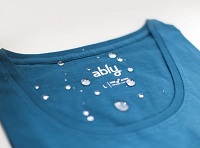"The apparel industry accounts for over 10 per cent of global carbon emissions and remains the second largest industrial polluter, second to the petroleum industry. About four million people are employed in the US fashion industry. The average household in America spent almost $2,000 last year on apparel and footwear, releasing high amount of carbon footprint."

The apparel industry accounts for over 10 per cent of global carbon emissions and remains the second largest industrial polluter, second to the petroleum industry. About four million people are employed in the US fashion industry. The average household in America spent almost $2,000 last year on apparel and footwear, releasing high amount of carbon footprint.
Presently, the US is the largest importer of garments in the world and nearly 40 per cent of apparel products sold in the US are imported from China. According to the Environmental Protection Agency, 13.1 million tons of textiles are trashed each year in the US, but only 15 per cent are donated or recycled. Washing and drying a load of laundry every two days produces roughly 970 pounds of CO2 per year.
The new idea – Filium

In this background, the scope of sustainability is growing faster than anyone could have ever imagined. The new contender in this line is Seattle-based apparel company, Ably. The basis for Ably’s eco-friendly clothing line is a patent-pending technology called Filium that activates its 100 per cent all-natural cotton. Filium is a process that makes natural fabrics like cotton, wool and silk repel liquids without affecting how soft and breathable they are. This makes Ably apparel incredibly stain and odour resistant, which means clothes stay cleaner and smell fresh for weeks on end.
Raj Shah, Co-founder, Ably and Co-creator, Filium, said that Ably and Filium were created to combat pollution problem. It’s going to take a lot of change in the industry to slow or reverse the effects of climate change. Having said that the company believes if they can give consumers the ability to choose to wear high-quality clothing that is long-lasted and sustainably made, then it is moving in the right direction.
The average cotton garment has an average life of about 40 washes. The new material will increase its lifespan at least 10 times. Washing in cold water extends the life even more. Ably clothes also hang dry really fast, so you don’t have to use the drier either, saving more electricity and extending the cloth’s life even further. Less loads of laundry means less carbon dioxide released into the atmosphere, less water and electricity usage, and less effluents that are released into our lakes, rivers, oceans and streams. Filium is completely safe and doesn’t use nanoparticles or harmful chemicals that can break down and leach into your skin or the environment, making it a breakthrough that could have a huge impact on the planet by reducing waste and wash cycles.
Dyeing, printing and bleaching textiles involve huge amounts of energy and chemicals along the entire manufacturing line. In fact, a quarter of all chemicals produced in the world are used in textiles. China produces 53 per cent of the world’s textiles, and discharges about 40 per cent of all dyeing chemicals worldwide. Other liquid-repelling fabrics are made with petroleum-based synthetic materials, like nylon and polyester, which just uses more petroleum and energy, so having cotton with the same characteristic is an even better way to reduce carbon footprint.
The amount of energy required to produce fibres for clothing varies widely among different fibres. Linen uses the least and is the most eco-friendly, and cotton is pretty low as well. Feedstock energy use reflects the energy associated with fossil fuel extraction.












